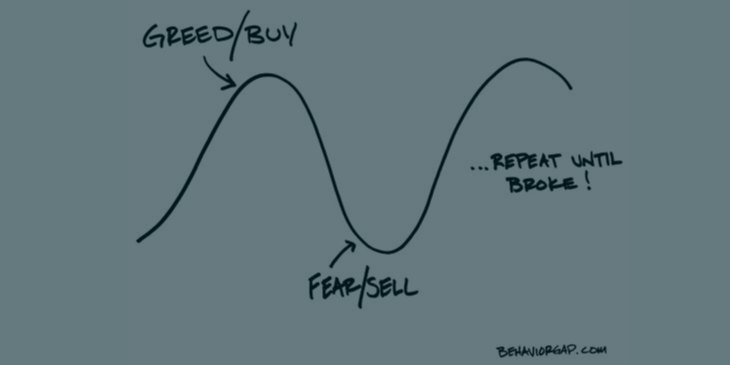Investing is a very emotional affair for most. People often run for the door and sell their investments when prices are plunging; and usually rush back in as prices soar to participate in the rally. This behavior results in buying high and selling low. It is certainly not a good investment strategy for making money. Vanguard has a great tool for visualizing the effects of this behavior.
This emotional behavior has been talked about for many years and many people are aware of it in theory. However, most fail to control their emotions and make logical decisions when presented with real-life situations that trigger panic or greed. Even some investment professionals fall victim to their emotions at times of market turmoil or euphoria.
For the average investor with a long time horizon, the best way to deal with this behavioral problem is to apply strict discipline to their investment strategy. If you follow the basic principles below, you will fare better than most in the long run:
Four tips for a better investment strategy
-
Contribute regularly to your investments
Have a set schedule for contributing to your investment account and invest your contribution regardless of where the market is. Ideally you want to have equal or increasing contributions at least semi-annually.
-
Diversify your investments
Put your investments in different asset classes such as stocks, bonds, and real estate. Within each asset class, make sure you invest in a diversified portfolio of holdings. For smaller account sizes this can be achieved using ETFs in a cost-effective way.
-
Rebalance your investments periodically
Have a set schedule to rebalance your portfolio. This means selling some of the assets that have performed well, and buying more of the ones that have underperformed to bring the weights of each asset back to your target weights (more on this later). Rebalancing should not be performed too frequently because of the trading costs involved. Many experts suggest semi-annual or annual rebalancing.
-
Keep investment fees low
Over-trading and/or investing in funds that have high expense ratios can significantly reduce long-term returns. If you invest directly in stocks or bonds, make sure you avoid excessive trading. For most investors I suggest investing in a few diversified portfolios using ETFs.
If you are interested in reading more about this subject and improving your investment strategy, I recommend The Intelligent Asset Allocator by William Bernstein.
